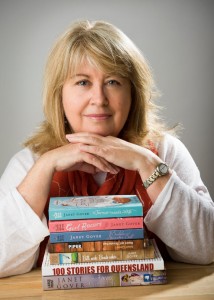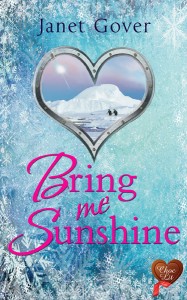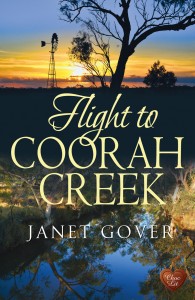Location, Location, Location
 A writing tutor once told me that setting is just the frame for a story. It contains the story and highlights it – without intruding upon it. I believed her – right up until I started seriously writing my own novels and short stories. That’s when I realised that what applies when buying a home is equally true when writing a story – location is everything!
A writing tutor once told me that setting is just the frame for a story. It contains the story and highlights it – without intruding upon it. I believed her – right up until I started seriously writing my own novels and short stories. That’s when I realised that what applies when buying a home is equally true when writing a story – location is everything!
Well – perhaps not quite everything – there are characters and plot and themes too. But the more I thought about it, the more I realised that location informs and develops characters, plot and themes.
From a space station in the distant future to a sailing ship a few hundred years ago; Regency drawing room to high-tech spy station – the settings we choose can make or break our stories.
When thinking about location (setting if you prefer) – there are two things. Location in space and location in time.
Star Wars gets it right – the first movie made opens with the words… A long time ago, in a galaxy far far away…
With those words we are transported to the Star Wars universe. We can then instantly accept the existence of space ships, weapons made of light, befuddled talking robots and a myriad of weird creatures. Had Chewbacca appeared on the streets of a small Texas town – we would have had a B-grade horror movie about a giant shaggy monster, not a Sci-Fi classic.

One of my favourite books of all time is Harper Lee’s To Kill A Mockingbird. The setting in the Deep South in the 1930’s allows her to delve into themes of race and justice and innocence in a way that would not be possible in, for example, then modern-day Los Angeles. The place and time highlight her themes and drive them. That’s not to say those themes can’t be addressed in modern LA – but it would be a very different book because the world has changed and societal norms have changed.
For this reason, I am not a huge fan of modern adaptations of Jane Austen’s books. The social pressures she wrote about were very different to social pressures today. And to me, the translation in time doesn’t often work.
Locations can reveal characters. If you set a scene in someone’s home or some intimate private place, describe the room. Are there books, or a TV? Is the room tidy or messy? Are there photos on the mantle, or is the room bare of any personal possessions? In telling the reader this, you are saying much about the character.
Locations can also develop characters. I always know where my characters spent their childhood – because that, in part, makes them who they are. A childhood in the crowded slums of an industrial city gives rise to a very different person to a childhood spent in a vast lonely cattle property.
I love to explore how our own backgrounds affect the way we see people and the way we react to them. What sort of conversation would develop between two people from such diverse backgrounds? What might they have in common? What might cause conflict between them?
Locations affect us in adulthood too. A trip to Jerusalem might alter a person’s view of religion; even a few hours spent in a prison could change a person for life; moving to a new city can bring about feelings of loneliness and alienation – or great excitement and opportunity… which brings me to location as a plot device.

In Game of Thrones, George R R Martin introduces Ned Stark and his daughters in their home in the north – where life is harsh but straightforward. He then transports them to Kings Landing, and drops them amid the intrigues of the royal court, for which they are not properly equipped. Then things happen that would never have happened had they stayed at Winterfell.
Location is adding to the plot, but it doesn’t always have to be so extreme.
Think of two characters having a conversation about a matter of some importance. How different might that conversation develop in the privacy of their home, as opposed to, for example, as they step into a crowded elevator?
When writing a scene, choose a location that adds to your plot and thematic development. If you want one character to dominate another, set the scene in a place where they feel comfortable but their companion does not – perhaps their office or other place of power. Does one character need to react unreasonably to something? Place the scene amid the noise and bustle of a busy airport terminal where tempters fray easily.
I have set most of my books in small town Australia. Readers tell me they love the unusual location. To me, it’s not at all unusual. That’s where I grew up. What is an exotic location for one person is simply home for someone else.
I always research and develop my locations – make them true to life. This adds depth to the book and the people in it. It places them in a real world – even if that world is a desert planet, a long time ago, in a galaxy far far away.
—
Janet Gover grew up in a small bush town in Australia – riding ponies and writing stories about them. Guessing she would never make a living from ponies, she became a journalist, a career move which has seen her living or working in more than fifty countries. While working in Hong Kong – she met an Englishman with green eyes, and as a result is now living in West London. She still travels extensively – but in her books she stays close to her Australian heritage. Or she has so far…
Website www.janetgover.com
Twitter @janet_gover
Facebook :janetgoverbooks
Category: Contemporary Women Writers, How To and Tips


























Thank you so much for this; it is particularly relevant to me as it was mentioned in the critique I have just received back from the New Writer’s Scheme in the Romantic Novelist’s Association. You’ve given me some great ideas here!
So true. Landscape as character adds so much to a story. Think Philip Roth without Newark. Or Barbara Kingsolver without nature. And yes, as in all things literary, authenticity is crucial. Cheers.
So true Randy. As writers, I think we draw on those places that mean the most to us for our inspiration. I’ve recently re-read Wuthering Heights. The use of the Yorkshire moors to highlight the themes and characters is wonderful. It ass that layer of realism because it makes the characters seem part of their world. All the best. Janet.
Thank you for this thought provoking article, Janet. I particularly liked the location as plot device. That is something that many writers do without realising it, but by drawing it to my attention, you have provided a new avenue for developing my stories.
Hi Jan. I am so glad you found the piece useful. I love being able to take something we use because we have to and develop it so it really contributes to the story, rather than simply framing it. Have fun with your locations. Best Janet
I would love to set my stories in places such as Paris and New York – I imagine they’d be lots of fun to write about. My current stories are all set in small towns because I live near a small town, and it’s easy to write about them. I agree, location is everything!
I write small town stories too Emmelie – set in Australia, where I grew up. I love small town series because each new book is like coming home to see old friends.
But you can still stretch your wings – there are so many ways to research places. I always look for blogs by people who have been there – that tends to give a far more personal approach than ‘official’ websites.
That’s the joy of books – they can take you anywhere!
The location can become a character in itself – think of The Shipping News! I love novels in which the setting comes truly alive – a tale that couldn’t be set anywhere else.
Agreed Jo. There are some books which set the location so firmly in your mind – and heart – that you almost feel that you have been there.
This is wonderful – excellent advice and much food for thought. As a reader I’d much rather come to know the character(s) in a book than be TOLD about them … but see, I can be big on TELLING when I feel at a loss for how to get something across. Thank you for giving such strong, practical guidance! Love this: “I always know where my characters spent their childhood – because that, in part, makes them who they are.” One more tool for my tool belt!
Thanks Donna – very glad to share my tools with you.
HOME. Faulkner called it his “postage stamp of native soil.” After 54 years, I returned to mine yesterday. I have a story and only in recent weeks did I understand that the setting needs to go home. So, when my 94 year old Mother asked me to drive her back to Alabama to visit a friend, I said, “If we can also go to 5601″…the old house. Mother is legally blind now and reminded me that she wouldn’t be able to see much, but yes…it would be fine with her for us to “drive by.” The old hill-top house on the corner was vacant. Stairs have rotted, walls have crumbled, the windows are barred. But, as was always the case, the back door was left unlocked. “They won’t mind if we go inside,” Mother said. I’m sure “they” are the spirits and characters of home, because we’ve no clue who’s been there since we moved when I was 6 years old. Within moments “they” were extending little shows of hospitality by the gracious gift of memory. “We” held hands as “they” walked us tenderly through every door. It astounds me that, while every house around this one has been modernized, 5601 has remained untouched, as if waiting all these years for us. Fifty-four of them and only a few layers of paint. Cabbage rose wallpaper that my mother helped her mother hang 80 years ago is still visible in places. As if the characters couldn’t speak loud enough a train rolled past to evoke the auditory world of my childhood and privet hedge aroma infused the air, reminding me of the shady place I played and pretended. I was fully present, a child all over again. Another sense was piqued when a superb play of morning light and pale wash upon the walls afforded my Mother rare and perfect vision. She placed people, furnishings and scenes beautifully upon our landscape, maybe even within the pages of a book. I’ve not checked my twitter feed in days. This was the first posting I saw upon waking. Location, location, LOCATION. I am taking every word of this straight to heart!
What an evocative story Vivienne. And exactly what I meant about location driving our writing forward. Thanks for sharing. Janet.
Thank YOU, Janet. After my exceptional experience and your inspiring words, I am off to purchase a lottery ticket, a machete and a hazmat suit (for overgrowth &
protection!) Joking, BUT… I really NEED to get that house back! I’d pack your motivational posting and blank sheets in my pocket, then situate myself in that place of my heart. I long to wake the sleeping, invite some new characters inside and then write with wild abandon. Fingers crossed I will! I’ve wind beneath my wings!
I agree Quiet Writer – setting work in places that provoke an emotional response in yourself can resonate in the story and give it added depth. So glad you found the post useful. Janet
“Place” is one of about four items my 1962-1963 college freshman writing teacher (published many times sense) instructed me after we reconnected about half a century later.
Your teacher was wise, Bob. It’s such an important part of the story. Glad you enjoyed the article. Janet
Really enjoyed it because location (or setting) is quite often the thing overlooked. I run a Creative Writing group for local 6 – 11 year olds and I have even spoken about it with them. Good article. Enjoyed it.
What fun it must be teaching creative kids. And I imagine it’s very rewarding. Janet
Fab article, Janet. I wrote my last scene (quite a big one) with absolutley no reference to setting, mainly because I was concerned about the dialogue of these two important characters. I woke up in a sweat thinking, I didn’t describe the setting! It’s Paris, it’s spring, it’s a hotel, they haven’t seen each other in years there has to be more to this than dialogue. It’s only the first draft so when I go back I’ll make sure I give a proper sense of time and place. I agree – very important.
Fran – your setting sounds wonderful – Paris in the spring is so romantic! Good luck with the rewrite. Janet.
I really enjoyed this post. I’ve always felt a sense of place added to a novel or story, sometimes in subtle ways, sometimes as a force in itself. It’s probably no surprise that I grew up loving Thomas Hardy. Much of my own writing is set in a specific place, either the area where I grew up or in places that have memories and emotional resonance for me. Definitely a post to make me think further. Thank you for this.